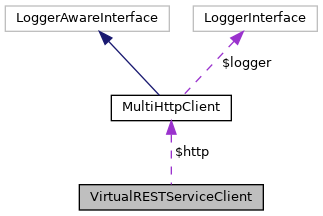Virtual HTTP service client loosely styled after a Virtual File System. More...

Public Member Functions | |
| __construct (MultiHttpClient $http) | |
| getMountAndService ( $path) | |
| Get the prefix and service that a virtual path is serviced by. More... | |
| mount ( $prefix, $instance) | |
| Map a prefix to service handler. More... | |
| run (array $req) | |
| Execute a virtual HTTP(S) request. More... | |
| runMulti (array $reqs) | |
| Execute a set of virtual HTTP(S) requests concurrently. More... | |
| unmount ( $prefix) | |
| Unmap a prefix to service handler. More... | |
Public Attributes | |
| const | VALID_MOUNT_REGEX = '#^/[0-9a-z]+/([0-9a-z]+/)*$#' |
Private Member Functions | |
| getInstance ( $prefix) | |
Private Attributes | |
| MultiHttpClient | $http |
| array | $instances = [] |
| Map of (prefix => VirtualRESTService|array) More... | |
Detailed Description
Virtual HTTP service client loosely styled after a Virtual File System.
Services can be mounted on path prefixes so that virtual HTTP operations against sub-paths will map to those services. Operations can actually be done using HTTP messages over the wire or may simple be emulated locally.
Virtual HTTP request maps are arrays that use the following format:
- method : GET/HEAD/PUT/POST/DELETE
- url : HTTP/HTTPS URL or virtual service path with a registered prefix
- query : <query parameter field/value associative array> (uses RFC 3986)
- headers : <header name/value associative array>
- body : source to get the HTTP request body from; this can simply be a string (always), a resource for PUT requests, and a field/value array for POST request; array bodies are encoded as multipart/form-data and strings use application/x-www-form-urlencoded (headers sent automatically)
- stream : resource to stream the HTTP response body to Request maps can use integer index 0 instead of 'method' and 1 instead of 'url'.
- Since
- 1.23
Definition at line 45 of file VirtualRESTServiceClient.php.
Constructor & Destructor Documentation
◆ __construct()
| VirtualRESTServiceClient::__construct | ( | MultiHttpClient | $http | ) |
- Parameters
-
MultiHttpClient $http
Definition at line 56 of file VirtualRESTServiceClient.php.
References $http.
Member Function Documentation
◆ getInstance()
|
private |
- Parameters
-
string $prefix
- Returns
- VirtualRESTService
Definition at line 301 of file VirtualRESTServiceClient.php.
Referenced by getMountAndService(), and runMulti().
◆ getMountAndService()
| VirtualRESTServiceClient::getMountAndService | ( | $path | ) |
Get the prefix and service that a virtual path is serviced by.
- Parameters
-
string $path
- Returns
- array (prefix,VirtualRESTService) or (null,null) if none found
Definition at line 104 of file VirtualRESTServiceClient.php.
References $matches, $path, and getInstance().
Referenced by runMulti().
◆ mount()
| VirtualRESTServiceClient::mount | ( | $prefix, | |
| $instance | |||
| ) |
Map a prefix to service handler.
If $instance is in array, it must have these keys:
- class : string; fully qualified VirtualRESTService class name
- config : array; map of parameters that is the first __construct() argument
- Parameters
-
string $prefix Virtual path VirtualRESTService | array $instance Service or info to yield the service
Definition at line 70 of file VirtualRESTServiceClient.php.
◆ run()
| VirtualRESTServiceClient::run | ( | array | $req | ) |
Execute a virtual HTTP(S) request.
This method returns a response map of:
- code : HTTP response code or 0 if there was a serious cURL error
- reason : HTTP response reason (empty if there was a serious cURL error)
- headers : <header name/value associative array>
- body : HTTP response body or resource (if "stream" was set)
- error : Any cURL error string The map also stores integer-indexed copies of these values. This lets callers do: list( $rcode, $rdesc, $rhdrs, $rbody, $rerr ) = $client->run( $req );
- Parameters
-
array $req Virtual HTTP request maps
- Returns
- array Response array for request
Definition at line 141 of file VirtualRESTServiceClient.php.
References runMulti().
◆ runMulti()
| VirtualRESTServiceClient::runMulti | ( | array | $reqs | ) |
Execute a set of virtual HTTP(S) requests concurrently.
A map of requests keys to response maps is returned. Each response map has:
- code : HTTP response code or 0 if there was a serious cURL error
- reason : HTTP response reason (empty if there was a serious cURL error)
- headers : <header name/value associative array>
- body : HTTP response body or resource (if "stream" was set)
- error : Any cURL error string The map also stores integer-indexed copies of these values. This lets callers do: list( $rcode, $rdesc, $rhdrs, $rbody, $rerr ) = $responses[0];
- Parameters
-
array $reqs Map of Virtual HTTP request maps
- Returns
- array $reqs Map of corresponding response values with the same keys/order
- Exceptions
-
Exception
Definition at line 163 of file VirtualRESTServiceClient.php.
References getInstance(), and getMountAndService().
Referenced by run().
◆ unmount()
| VirtualRESTServiceClient::unmount | ( | $prefix | ) |
Unmap a prefix to service handler.
- Parameters
-
string $prefix Virtual path
Definition at line 89 of file VirtualRESTServiceClient.php.
Member Data Documentation
◆ $http
|
private |
Definition at line 47 of file VirtualRESTServiceClient.php.
Referenced by __construct().
◆ $instances
|
private |
Map of (prefix => VirtualRESTService|array)
Definition at line 49 of file VirtualRESTServiceClient.php.
◆ VALID_MOUNT_REGEX
| const VirtualRESTServiceClient::VALID_MOUNT_REGEX = '#^/[0-9a-z]+/([0-9a-z]+/)*$#' |
Definition at line 51 of file VirtualRESTServiceClient.php.
The documentation for this class was generated from the following file:
- includes/libs/virtualrest/VirtualRESTServiceClient.php
